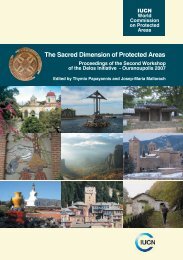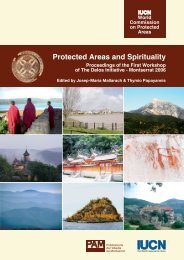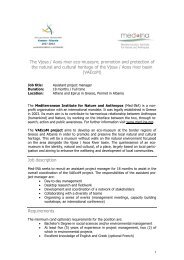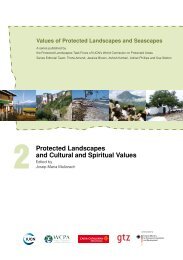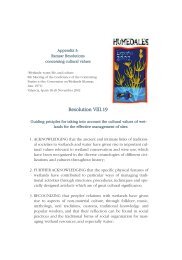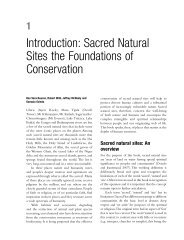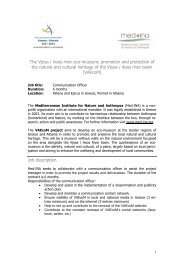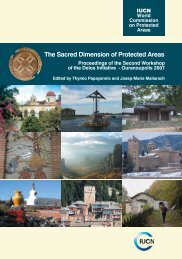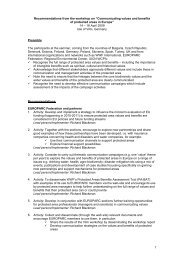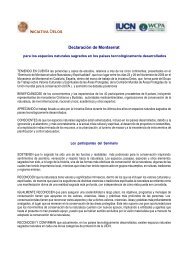The Diversity of Sacred Lands in Europe - IUCN
The Diversity of Sacred Lands in Europe - IUCN
The Diversity of Sacred Lands in Europe - IUCN
Create successful ePaper yourself
Turn your PDF publications into a flip-book with our unique Google optimized e-Paper software.
ena <strong>in</strong> Anatolia and the Balkans and<br />
even <strong>in</strong>vented the term ‘dendrolatry’<br />
(tree worship) to describe this practice<br />
(Zarcone, 2005).<br />
What those people witnessed was a<br />
special relationship <strong>of</strong> these Muslim<br />
populations with nature, which does not<br />
exist among other Muslim believers <strong>in</strong><br />
the Middle East and North Africa. This<br />
relation was the outcome <strong>of</strong> a cross-fertilisation<br />
<strong>of</strong> beliefs and practices <strong>in</strong>spired,<br />
on the one hand, by Islam (and<br />
especially the Arab-Muslim philosophy<br />
and Ibn S<strong>in</strong>a and al-Farabi) and Sufism<br />
and, on the other, by animism, shamanism<br />
and Buddhism (Zarcone, 2005).<br />
Islam and the natural<br />
environment<br />
<strong>The</strong> Alevi-Bektashi religious traditions,<br />
although ‘heterodox’ (i.e. non-Sunni or<br />
orthodox Shi’a), are Islamic. Hence, it<br />
would be useful to review the positions<br />
<strong>of</strong> the Islamic faith regard<strong>in</strong>g nature<br />
and its protection.<br />
Islam is the easiest religion to understand,<br />
yet imperfectly understood by<br />
non Muslims. It is the faith <strong>of</strong> one God,<br />
whose will was revealed to Muhammad<br />
and was <strong>in</strong>cluded <strong>in</strong> the sacred book,<br />
the Holy Qur’an. It is not well understood<br />
because <strong>in</strong> the West its name is associated<br />
with terrorism and <strong>in</strong>tolerance. In<br />
Arabic it means peace through surrender<br />
or submission to the will <strong>of</strong> God, and<br />
Muslim, is the one who is at peace<br />
through submission to God. Islam is a<br />
Dîn (Tradition) embrac<strong>in</strong>g all aspects <strong>of</strong><br />
life (as <strong>in</strong> the case <strong>of</strong> H<strong>in</strong>duism). <strong>The</strong>re is<br />
Allah’s name by 17th century Ottoman artist<br />
Hâfız Osman.<br />
no dist<strong>in</strong>ction <strong>in</strong> Islam between th<strong>in</strong>gs<br />
pr<strong>of</strong>ane and th<strong>in</strong>gs sacred. Everyth<strong>in</strong>g a<br />
Muslim does is to please God, so all his<br />
good actions are be<strong>in</strong>g seen as worship.<br />
<strong>The</strong>refore, all social, political, legal, adm<strong>in</strong>istrative<br />
and economic activities <strong>in</strong><br />
the Islamic society are as sacred as<br />
pray<strong>in</strong>g <strong>in</strong> the Mosque (Norcliffe, 1999).<br />
In addition, man’s position <strong>in</strong> the world<br />
is tw<strong>of</strong>old: he is at the same time ‘abd<br />
– slave, or even better abd-Allah – the<br />
slave <strong>of</strong> God, and also khalifah – vice<br />
regent, or representative, which elevates<br />
humans above all other creatures<br />
<strong>of</strong> the Creation (NasseJ, 1986).<br />
Prophet Muhammad taught ‘<strong>The</strong> world<br />
is green and beautiful, and God (Allah)<br />
has appo<strong>in</strong>ted you his guardian over it’.<br />
Muslims believe that Allah created humans<br />
to be the khalifah, the vice regents<br />
<strong>of</strong> the creation. By that, it is stated<br />
that nature is not ours and we can not<br />
do with it as we please. Instead, we<br />
must act as its protectors (ARC, 2011).<br />
96



